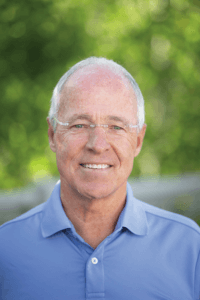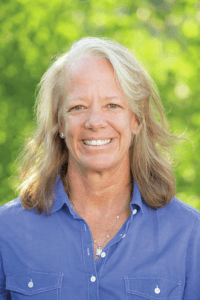AVH Board members represent a wealth of diverse experiences and strengths
With two physicians, two attorneys and a successful local business owner, the Aspen Valley Hospital Board of Directors certainly has a wealth of diverse experiences to call upon when making decisions. And while that means discussions can get “spirited” at times at monthly Board meetings, it is also an essential strength for the Board and the Hospital.
“If everybody agreed all the time, we wouldn’t need a Board, we’d need a king. I am here to tell you we do not need a king,” said Lee Schumacher, Vice Chair of the Board and a self-proclaimed “huge proponent” of the Board of Directors model. “What we need and what we have is five diverse individuals, and all of us bring a dose of reality based on our individual experiences and insights.”
MEMBERS OF THE BOARD INCLUDE:
– Melinda Nagle, MD, Chair
– Lee Schumacher, Vice Chair
– Chuck Frias, Treasurer
– Greg Balko, MD, Director
– David Eisenstat, Director

As physicians practicing in the AVH Network of Care, Drs. Nagle and Balko bring a deep knowledge of medical technology and standards of care. Schumacher and Eisenstat both had long careers in different aspects of healthcare law. And Frias, a longtime local businessman, brings special fluency in business matters and local culture.
“We are challenged by serving a broad community with many different services, and we face a variety of situations to manage,” Frias said. “Diversity brings more knowledge to all those different situations so that we can make decisions based on doing what’s right for the Hospital and our community.”
Recent interviews with all five Board members reflected their distinct and well-rounded perspectives on the short- and long-term issues facing AVH.
RESPONDING TO COVID-19

Over the past year, no issue has been more urgent than the Hospital’s response to the COVID-19 pandemic. Since starting its Incident Command response on March 9, 2020, AVH has maintained a multifaceted battlefront based on the evolving best practices available in the time.
“One of the great accomplishments to emerge from the pandemic was how effectively our people responded,” Dr. Nagle said. “AVH took the lead on testing for COVID, on managing vaccinations and on keeping the community informed. These factors — in addition to working with our community partners, such as Pitkin County Public Health — were incredibly important in helping us navigate the pandemic.”
For Schumacher, success started at the top with an administrative and medical executive team whose experience, training and leadership made a major difference.
“Nobody downplayed the virus,” Schumacher said. “When the pandemic first started, we had a team that looked ahead and asked how this could affect our patients, staff and operations. Then, they were taking actions like making sure we had plenty of personal protective equipment (PPE). Those steps, early on, helped to keep the pandemic as much under control as possible.”
Eisenstat agreed that AVH’s ability to respond to fast-changing conditions was crucial, noting the organization was able to “stay nimble, learn and adapt, sometimes from hour to hour. We stuck to the science as it was known and we evolved, always working together as a team. Staff worked long hours, often at significant personal risk, and never lost focus. The list of heroes is long.”
Those heroes included the medical staff, whose knowledge and dedication were an inspiration to everyone in the community. On matters of science, administrators heeded the experts: physicians, nurses and other clinical personnel.
Frias cited AVH teams’ readiness as a key to the Hospital’s response to the crisis. “We were prepared with PPE to protect the medical and support staff, and we had to be ready to help community members who became infected,” he said. “We were also able to be a consistent voice for following community health protocols, which helped avoid confusion and created a clear message to reduce the spread of the virus.”
A POLICY OF PREPAREDNESS
In important ways, these preparations went much further back. Dr. Balko pointed out a notable example: the Master Facilities Plan, which was developed in the wake of other public health crises, such as the Ebola outbreaks in Africa in the early part of this century.

“We tried to be proactive, so we planned a lot of isolation rooms in the Hospital,” Dr. Balko said. “Looking back at our experiences during COVID, that definitely was a very smart thing to do. A lot of hospitals on the Western Slope don’t have the number of isolation rooms that we have. Because of that, we were able to protect patients and staff during the pandemic.”
Discussions about the Master Facilities Plan were instrumental in Dr. Nagle’s original desire to join the Board of Directors 14 years ago. Today, she is watching this extraordinarily ambitious and far reaching initiative enter its fourth and final phase.
“I am personally proud to have been a part of the plan from its inception,” she said. “It is great to see it coming even closer to fruition as we approach our goals on fundraising and completion of construction.”
This brings up an important point about the role of the AVH Board of Directors. Among its duties, the Board puts the Hospital leadership in place, empowers those leaders to establish a culture focused on patient-centered care, sets high-level organizational priorities and ensures that AVH maintains a position of financial strength.
Other effects of those decisions of past years became apparent, too, as when AVH temporarily suspended elective medical procedures in the spring of 2020 as a safety precaution.
“The fiscal responsibility that the Board has shown over all these years paid off at a time when nobody would have predicted we’d have to shut down elective surgeries for over a month,” Dr. Balko said. “We also saw benefits in our low patient-to-nurse ratio; because we had those policies in place, our nurses didn’t get overwhelmed with patients.”
MEMORABLE ACHIEVEMENTS
Beyond COVID-19, Board members are proud of many other accomplishments, one of which has already been mentioned: completing Phases 1-3 of the Master Facilities Plan. The new campus replaces the former hospital, which was built in 1977 — an era when medical technology, federal and state rules, industry regulations and the delivery of healthcare were dramatically different than they are today.

Schumacher tells an enlightening story of hearing a physician who expressed support for updated facilities by commenting, “I’m not still driving my 1977 Chevy Nova.”
“The Master Facilities Plan is a source of pride for me and should be for the entire community,” Schumacher said. “When people want to buy a home and raise their families in a new community, schools and hospitals are the two things they ask about. There are not many towns with 6,000 year-round residents that have the quality of care that AVH and its providers give to our community.”
Recruiting talented administrators, clinicians and others to the Hospital has been a major driver of AVH’s success. During his first term on the Board of Directors, Dr. Balko saw a hospital “on the brink of insolvency” and is proud of having played a role in bringing it back to a position of leadership and strength.
Serving on the search committee that brought CEO Dave Ressler back to AVH in 2016 is a point of particular pride for Eisenstat, who led the CEO search committee. “When I look back over the nine years I’ve been on the Board, I think of that as a singular achievement,” he said, adding that his work to help recruit and hire physicians for the Hospital’s Network of Care also has been gratifying. “Trust among hospital leadership, the medical staff, and throughout the community at large is built one brick at a time over a period of years. We’ve taken many right steps in that regard, hiring talented people and instilling a culture of always putting our patients first. Trust is an invaluable asset, particularly in times of crisis.”
That brick-by-brick approach is reflected in Dr. Nagle’s sense of accomplishment, as well. “I am proud of what AVH does day in and day out as a healthcare leader,” she said, “not just within the walls of the Hospital, but throughout the community.”
DYNAMIC CHANGES
As AVH commences work on the final phase of the Master Facilities Plan, change will continue, and significant new challenges will arise in the future. Frias said that, in the years ahead, the Board will have to address the “constant pressure to manage costs and provide quality service given pricing pressure and staff shortages.”

Eisenstat identified a specific undertaking as one of the major tests in AVH’s path: implementation of the Epic electronic health records system. “That will be an immediate and daunting challenge over the next two years in terms of human and financial resources,” he said. “But it is vital for the future of the hospital.”
Financial matters are very much top-of-mind for Dr. Nagle: “The cost of healthcare and how that is being played out at legislative levels will provide huge challenges for all sectors of the industry — and likely even more on rural health organizations and our ability to maintain the resources to provide the best care.” On that front, she said, AVH has a distinct advantage, as it has “taken the lead on population health, as well as worked towards efficiencies in healthcare delivery. That will help us meet those challenges.”
Eisenstat agrees that healthcare’s evolution from a fee-for-service model to a population health paradigm, in which the Hospital strives to improve the health outcomes for the entire community, is a crucial dynamic affecting the industry. The Board’s role, he said, will be to provide AVH’s executive team with the support and tools needed to make the transition.
Despite the deep experience and expertise of its members, though, the Board ultimately has a limited ability to see into the future. That fact makes a prudent approach all the more important in areas such as anticipating medical technology and regulatory requirements to come.
“Twenty years from now we’ll have technology that, despite our best efforts, nobody can imagine today,” Schumacher said. “That’s the kind of thing we have to keep an eye on and try to stay ahead of the curve.”
About the AVH Board of Directors
MELINDA NAGLE, MD, CHAIR
Dr. Nagle is an obstetrician/gynecologist at AVH. She received her medical degree from New York Medical College and completed her residency at Cedars-Sinai Hospital in Los Angeles. Before medical school, she was a tennis professional in Aspen. In addition to serving as Chair of the AVH Board of Directors, Dr. Nagle serves on the Board of the Aspen Hope Center and the Aspen Valley Hospital Foundation Board of Directors.
LEE SCHUMACHER, VICE CHAIR
Schumacher moved to the Roaring Fork Valley in 1980. He is an attorney specializing in taxation and real estate, and he has law degrees from the University of Denver College of Law. His law firm has represented physicians and physician groups for more than 25 years. He also serves on the Board of Aspen Country Day School.
CHUCK FRIAS, TREASURER
Frias has lived in Aspen since 1974 and is owner of Frias Properties of Aspen, a local property management and real estate company. He has served on many local organizational boards such as the Aspen Chamber Resort Association, Aspen Lodging Association, Aspen Junior Hockey, Aspen School District Financial Advisory Board and more.
GREG BALKO, MD, DIRECTOR
Dr. Balko is a board-certified emergency medicine physician who served on the Board of Directors from 2004-2008 and from 2016 to the present. In his role on the Board, he advocates for augmenting AVH’s facilities and care, expanding the scope of the medical staff and Hospital services, and maintaining the Hospital’s financial strength.
DAVID EISENSTAT, DIRECTOR
Eisenstat joined the Board of Directors in 2013. He was a senior partner and head of the health industry department of the Washington, D.C. law firm Akin, Gump, Strauss, Hauer & Feld before retiring in 2012. He has served on the Hospital’s Audit Committee since 2007, chaired the 2016 CEO Search Committee and chairs the Compensation Committee.

